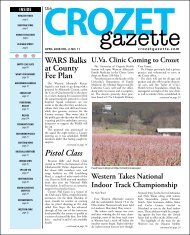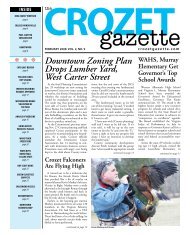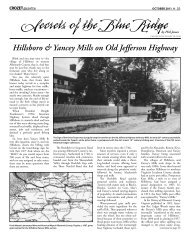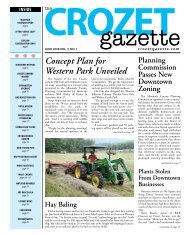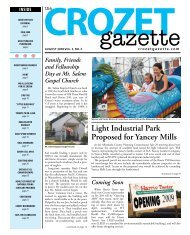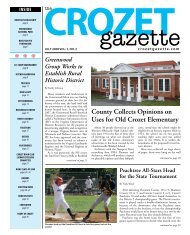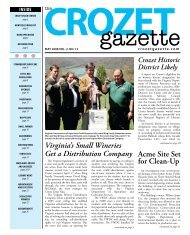Local Supervisors Told to Cut Spending, Leave Tax ... - Crozet Gazette
Local Supervisors Told to Cut Spending, Leave Tax ... - Crozet Gazette
Local Supervisors Told to Cut Spending, Leave Tax ... - Crozet Gazette
Create successful ePaper yourself
Turn your PDF publications into a flip-book with our unique Google optimized e-Paper software.
<strong>Crozet</strong> gazette APRIL 2009 s page 5<br />
Seedtime is a time of faith and hope—faith in<br />
the vitality of the seed and hope that Providence<br />
will again supply the nurture through harvest<br />
time.<br />
Pleasant Green, the old Wayland homestead<br />
west of <strong>Crozet</strong>, Virginia, has witnessed an abundance<br />
of seedtimes over the past 175 (!) years. It<br />
has seen the local economy progress from <strong>to</strong>bacco<br />
<strong>to</strong> fruit <strong>to</strong> industrial manufacturing. In 1838, as<br />
one of the newer homes in western Albemarle<br />
County, it s<strong>to</strong>od by while Claudius <strong>Crozet</strong><br />
(1789–1864), Principal Engineer for the State of<br />
Virginia, passed by its front porch, marking a furrow<br />
for future railroaders <strong>to</strong> follow. A dozen years<br />
later it served as a place of respite for Colonel<br />
<strong>Crozet</strong> while teams of laborers worked <strong>to</strong> fulfill<br />
his vision of a great road “over and through the<br />
Blue Ridge.”<br />
With the 1836 chartering of the Louisa<br />
Railroad, predecessor <strong>to</strong> the Virginia Central<br />
Railroad, the pace of life that had characterized<br />
old Virginia was altered for all time. Along that<br />
rail line, 20 miles north of Richmond and 90<br />
miles east of Jeremiah Wayland’s Albemarle<br />
County abode, s<strong>to</strong>od another plantation with ties<br />
<strong>to</strong> the Old Dominion’s aris<strong>to</strong>cracy.<br />
Hickory Hill plantation was established on<br />
land long associated with the Carter family of<br />
Shirley Plantation. Political and social opportunities<br />
were the norm in this family also allied with<br />
the Nelsons of early Virginia. General Robert E.<br />
Lee was yet another esteemed member of this<br />
extended family. Anne Butler Carter moved <strong>to</strong><br />
Hickory Hill following her marriage <strong>to</strong> W. F.<br />
Wickham. Their first child, Williams Carter<br />
Wickham, had been born in Richmond in 1820,<br />
prior <strong>to</strong> his family’s move in<strong>to</strong> rural Hanover<br />
County.<br />
Williams Carter Wickham grew up on the<br />
Hickory Hill estate and, along with his father,<br />
watched as the Louisa Railroad was constructed<br />
through their working plantation. A s<strong>to</strong>p was<br />
established there, appropriately named Wickham,<br />
and their crops were loaded at its adjacent rail<br />
siding.<br />
Following his graduation from the University<br />
of Virginia, W. C. Wickham entered law practice<br />
in 1842. Much of his time was spent, however,<br />
managing the business affairs of Hickory Hill. By<br />
1849 he had married, was serving as a justice on<br />
the Court of Hanover County and had been<br />
elected <strong>to</strong> the Virginia House of Delegates. His<br />
military responsibilities began with his appointment<br />
as Captain of a cavalry unit in the Virginia<br />
militia.<br />
With the outbreak of the Civil War, his company<br />
aligned itself with the Confederate Army.<br />
Wickham participated in many of the major battles.<br />
He was severely wounded more than once,<br />
captured by the enemy and paroled. He was promoted<br />
<strong>to</strong> Brigadier General in September 1863<br />
and served in that commission for 13 months.<br />
By the end of the war’s hostilities in the spring<br />
of 1865, the Virginia Central Railroad had suffered<br />
severe damage. The states of Virginia and<br />
(newly formed) West Virginia partnered <strong>to</strong><br />
rebuild and expand this rail link so vital <strong>to</strong> their<br />
economic recoveries. Williams Carter Wickham<br />
was hired as president of the Virginia Central<br />
by Phil James<br />
Williams Carter Wickham and <strong>Crozet</strong>, Virginia<br />
Williams Carter Wickham was a graduate of U.Va., a<br />
Brigadier General in the Civil War, a State Sena<strong>to</strong>r,<br />
President of the Virginia Central Railroad and Vice-<br />
President of the Chesapeake and Ohio Railroad.<br />
This early woodcut shows a train approaching “Wickham’s Corn-Sheds” on the Virginia Central Railroad in Hanover County.<br />
Railroad Company that November, and when the<br />
company merged with the Coving<strong>to</strong>n and Ohio<br />
Railroad in 1868 <strong>to</strong> form the Chesapeake and<br />
Ohio RR, Wickham was retained as president of<br />
the new corporation.<br />
Monies required <strong>to</strong> fund expansions <strong>to</strong> the<br />
refurbished railroad were severely lacking during<br />
the nation’s reconstruction period. Wickham<br />
secured solid backing when he was able <strong>to</strong> trumpet<br />
the merits of the C&O <strong>to</strong> a group of inves<strong>to</strong>rs<br />
headed by railroad magnate Collis P. Hunting<strong>to</strong>n.<br />
Hunting<strong>to</strong>n assumed the presidency of his newest<br />
investment and Wickham became his vicepresident.<br />
Meanwhile, back in dear old Albemarle<br />
County, the details of the last will and testament<br />
of Samuel Miller had been hammered out in the<br />
courts, and preliminary work had begun on<br />
Miller’s monumental gift <strong>to</strong> the orphaned children<br />
of his native county. The closest point on<br />
the railroad <strong>to</strong> receive delivery of materials for<br />
Miller’s school and shops was the Mechums River<br />
Depot. Because of the enormous scope of the<br />
project, Miller School officials petitioned the<br />
Chesapeake and Ohio Railroad <strong>to</strong> establish a<br />
whistle s<strong>to</strong>p three miles west of Mechums River<br />
at a point closer <strong>to</strong> the road <strong>to</strong> Batesville.<br />
After watching the steady procession of goods<br />
and traffic along the eastern edge of his farm during<br />
the summer of 1876, Abraham Wayland (son<br />
of patriarch Jeremiah) settled in his mind what<br />
needed <strong>to</strong> be the next logical step. He sent his son<br />
Charles, then 15 years old, on horseback <strong>to</strong> the<br />
surrounding farms <strong>to</strong> collect signatures on a petition<br />
requesting the C&O establish an official stacontinued<br />
on page 6



